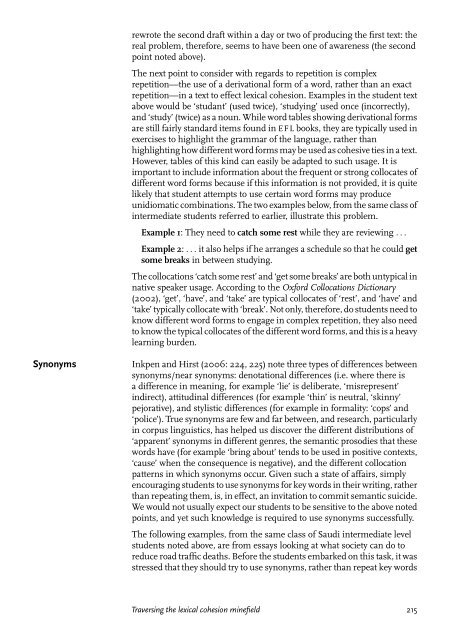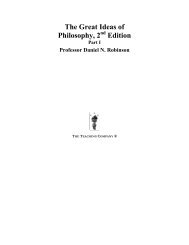Traversing the lexical cohesion minefield
Traversing the lexical cohesion minefield
Traversing the lexical cohesion minefield
You also want an ePaper? Increase the reach of your titles
YUMPU automatically turns print PDFs into web optimized ePapers that Google loves.
ewrote <strong>the</strong> second draft within a day or two of producing <strong>the</strong> first text: <strong>the</strong>real problem, <strong>the</strong>refore, seems to have been one of awareness (<strong>the</strong> secondpoint noted above).The next point to consider with regards to repetition is complexrepetition—<strong>the</strong> use of a derivational form of a word, ra<strong>the</strong>r than an exactrepetition—in a text to effect <strong>lexical</strong> <strong>cohesion</strong>. Examples in <strong>the</strong> student textabove would be ‘studant’ (used twice), ‘studying’ used once (incorrectly),and ‘study’ (twice) as a noun. While word tables showing derivational formsare still fairly standard items found in EFLbooks, <strong>the</strong>y are typically used inexercises to highlight <strong>the</strong> grammar of <strong>the</strong> language, ra<strong>the</strong>r thanhighlighting how different word forms may be used as cohesive ties in a text.However, tables of this kind can easily be adapted to such usage. It isimportant to include information about <strong>the</strong> frequent or strong collocates ofdifferent word forms because if this information is not provided, it is quitelikely that student attempts to use certain word forms may produceunidiomatic combinations. The two examples below, from <strong>the</strong> same class ofintermediate students referred to earlier, illustrate this problem.Example 1: They need to catch some rest while <strong>the</strong>y are reviewing ...Example 2: ...it also helps if he arranges a schedule so that he could getsome breaks in between studying.The collocations ‘catch some rest’ and ‘get some breaks’ are both untypical innative speaker usage. According to <strong>the</strong> Oxford Collocations Dictionary(2002), ‘get’, ‘have’, and ‘take’ are typical collocates of ‘rest’, and ‘have’ and‘take’ typically collocate with ‘break’. Not only, <strong>the</strong>refore, do students need toknow different word forms to engage in complex repetition, <strong>the</strong>y also needto know <strong>the</strong> typical collocates of <strong>the</strong> different word forms, and this is a heavylearning burden.SynonymsInkpen and Hirst (2006: 224, 225) note three types of differences betweensynonyms/near synonyms: denotational differences (i.e. where <strong>the</strong>re isa difference in meaning, for example ‘lie’ is deliberate, ‘misrepresent’indirect), attitudinal differences (for example ‘thin’ is neutral, ‘skinny’pejorative), and stylistic differences (for example in formality: ‘cops’ and‘police’). True synonyms are few and far between, and research, particularlyin corpus linguistics, has helped us discover <strong>the</strong> different distributions of‘apparent’ synonyms in different genres, <strong>the</strong> semantic prosodies that <strong>the</strong>sewords have (for example ‘bring about’ tends to be used in positive contexts,‘cause’ when <strong>the</strong> consequence is negative), and <strong>the</strong> different collocationpatterns in which synonyms occur. Given such a state of affairs, simplyencouraging students to use synonyms for key words in <strong>the</strong>ir writing, ra<strong>the</strong>rthan repeating <strong>the</strong>m, is, in effect, an invitation to commit semantic suicide.We would not usually expect our students to be sensitive to <strong>the</strong> above notedpoints, and yet such knowledge is required to use synonyms successfully.The following examples, from <strong>the</strong> same class of Saudi intermediate levelstudents noted above, are from essays looking at what society can do toreduce road traffic deaths. Before <strong>the</strong> students embarked on this task, it wasstressed that <strong>the</strong>y should try to use synonyms, ra<strong>the</strong>r than repeat key words<strong>Traversing</strong> <strong>the</strong> <strong>lexical</strong> <strong>cohesion</strong> <strong>minefield</strong> 215














